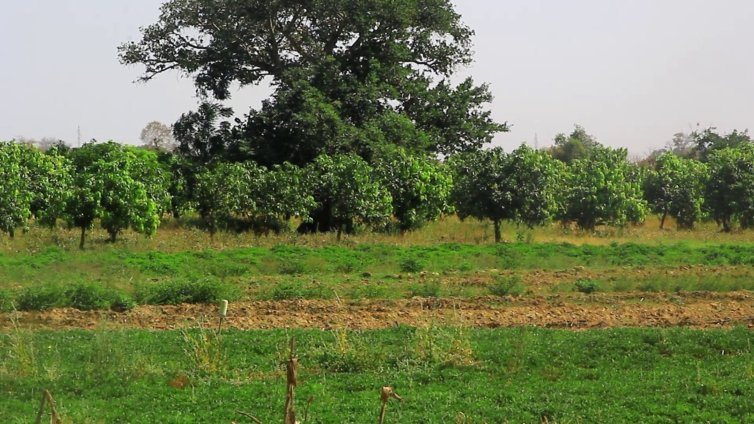The International Union for Conversation of Nature (IUCN) has asked farmers not to cut down trees on farmlands.
Having trees on farmlands had multiple advantages, including the promotion of biodiversity and sustainable agriculture practices in the country.
Speaking at the end of a two-day stakeholders’ dialogue on Sustainable Agricultural Practices in Ghana, Dr Jacques Somda, the Head of Programmes at IUCN in Burkina Faso, said farmers who had trees on farmlands benefitted from microclimate, which enhanced their work.
“There are ecosystems services that some of these trees can bring if planted. You can also benefit from the carbon market as trees are stocking carbon and if you have well managed agro-forestry, you can sell both crops and the carbon because there exist carbon markets,” he said.
He explained that on the carbon markets, countries had a system of ensuring that what they were reporting was stocked in the trees underground and having trees on farms increased the carbon sink, which was a source of income for farmers.
Dr Somda spoke about the current challenges with food systems due to the increasing population growth rate, which was contributing to nature degradation.
It was important to bring stakeholders together to discuss sustainable ways to improve agriculture production for food and to ensure the recovery of the natural eco-system of lands meant for agricultural purposes.
“We need to find ways of sustenance for small holder farmers without destroying the natural eco systems,” he said.
Dr Somda noted that food system had many challenges especially in the way people handle the agro chain by way of processing and storage.
“If households are wasting food, we are in the process of negatively impacting on the natural ecosystems because when you waste food you have to request more production and to get more production, the system calls for increased use of fertilizer, weedicides and pesticides and same disturb the ecosystem.
Dr Somda said IUCN intends to get small holder farmers, conservationists, agriculturalists, and the financial sector to discuss and see what was missing in the country’s bid to achieve sustainable agricultural practices.
“We need to find out who is responsible for the missing element so that the country can transition to sustainable agriculture because we know that sustainable agriculture has to do with new investments in terms of inputs and equipment for farmers, new investment in terms of practice and postproduction.”
Dr Joachim Ayiiwe Abugba, Basin Head, Black Volta Basin, Water Resource Commission said sustainable agricultural practices are practices that are supposed to insure the improvement of biodiversity and water management.
Dr Abugba said Water management has to do with the availability of quality water for the uses of various purposes adding “waterbody is a receipt; it receives everything within the land scape.”
“If we have good practices, you receive quality practices. The bad practices of water management could have consequences on biodiversity in terms of vegetation and aquatic life,” he added.
Dr Abugba improving the health of water bodies was directly linked to improvement of the kind of agricultural practices that farmers were practising.
He noted that in the Northen part of Ghana, 70 per cent of the population were into agriculture and for them to continue with farming, “you need water, so we need to improve our soil health, our water management practices, would inure to the health of our people.”
Mr Kwame Agyei, the Regional Manager, Plantation Department, Forest Services Division, Forest Commission said agriculture needed forests to thrive.
“So, if we lose all the trees in the landscape, agriculture productivity goes down, your soil becomes depleted, your rainfall pattern becomes affected so you will not get good yield.”
Mr Agyei said the Forestry Commission’s focus now was rehabilitating degraded forest and several programmes have been introduced by the government to that effect.
He said the commission has therefore categories areas into three themes, namely plantation development where they were planting trees in areas that were degraded, giving seedlings to farmers to plant within their farms and planting more trees in areas that were not so degraded but have lost some species.
“All these measures are to ensure that there are tree covers all over the country so that agriculture can thrive," he said.
He called for strengthened collaboration with the Ministry of Food and Agriculture to address some institutional issues, to protect the country’s forest activities including sustainable agriculture.
The two meetings brought together over 30 experts in agriculture and conservationists, to discuss challenges associated with sustainable practices in Ghana.
The participants also delved into issues on Voluntary Guidelines on Responsible Governance of Land Tenure (VGGT) and responsible investment in agricultural and food systems.
Latest Stories
-
Western Region: NDC youth wing embarks on phase 2 of ‘retail campaign’
21 mins -
Action Chapel International holds annual Impact Convention in November
21 mins -
Jana Foundation urges young women to take up leadership roles
26 mins -
All set for Joy FM Prayer Summit for Peace 2024
37 mins -
Managing Prediabetes with the Help of a Dietitian
56 mins -
Joy FM listeners criticise Achiase Commanding Officer’s election comment
1 hour -
Legal Aid Commission employees threaten strike over poor working conditions
1 hour -
Ghana ranked 7th globally as biggest beneficiary of World Bank funding
1 hour -
IMF board to disburse $360m to Ghana in December after third review
2 hours -
Former Bono Regional NPP organiser donates 13 motorbikes to 12 constituencies
2 hours -
Securities industry: Assets under management estimated at GH¢81.7bn in quarter 3, 2024
2 hours -
Gold Fields Ghana Foundation challenges graduates to maximise benefits of community apprenticeship programme
3 hours -
GBC accuses Deputy Information Minister Sylvester Tetteh of demolishing its bungalow illegally
3 hours -
Boost for education as government commissions 80 projects
4 hours -
NAPO commissions library to honour Atta-Mills’ memory
4 hours

